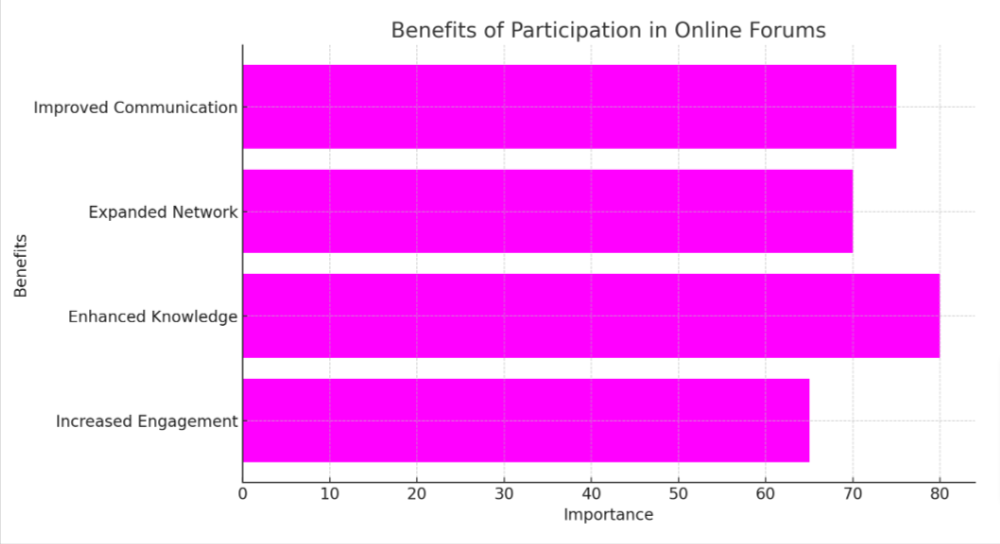Engaging in Community: The Power of Live Chat Forums and Discussions
Ever wondered how to make the most out of online chats and forums? These platforms are where ideas bloom and questions find answers, with over 3.6 billion people engaging in social media worldwide – a number that continues to grow.
This blog is your guide to diving into virtual discussions effectively, offering tips on contributing meaningfully and creating connections. Keep reading; you’re about to join the conversation like never before!
Key Takeaways
- Discussion forums are critical in education for boosting participation and allowing students to delve deeper into subjects. They offer a platform for sharing diverse perspectives, enhancing critical thinking skills, and improving communication abilities.
- Effective participation in live chat topics requires active listening, respectful communication, and sharing valuable insights. Strategies such as asking clarifying questions and using supportive language are key to fostering positive interactions within online communities.
- Online discussion platforms vary in purpose, including Q&A sessions, support forums, niche interest groups, and professional networking spaces. Understanding the forum’s purpose is essential for meaningful engagement.
- Building a sense of community within these platforms involves acknowledging contributions from all members, creating an inclusive environment that encourages collaborative learning and continuous dialogue.
- Facilitating online discussions effectively means setting the stage for open dialogue with strategic questioning while maintaining respect for differing opinions to promote constructive outcomes.
The Role of Discussion Forums in Education
Discussion forums play a crucial role in education by providing students with a platform to engage in ongoing conversations and collaborate with their peers. This encourages active participation, enables the exchange of valuable ideas, and fosters a sense of community within virtual learning environments.
Benefits for students
Participating in forums and discussions on live chat topics offers students a dynamic way to learn. It encourages them to engage more deeply with course material.
- Students gain exposure to diverse perspectives, which broadens their understanding of subjects.
- They develop critical thinking skills by analyzing and questioning arguments presented in the forum.
- Participation helps improve written communication, as students must clearly articulate their thoughts in chat discussions.
- Forums provide a platform for student engagement, sparking interest and motivation through interactive conversation.
- Engaging in forums fosters collaborative learning as students share information and work together towards common goals.
- Live chat conversations offer immediate feedback, allowing for quicker adjustments in understanding or approach.
- Online communities enable shy or reticent students to participate without the anxiety of speaking up in class.
- Virtual conversations encourage ongoing conversations that extend beyond classroom walls and schedules.
- Active involvement in online conversations prepares students for digital communication norms prevalent in the modern workplace.
- Contributing to live chat topics builds a sense of community among peers, promoting a supportive learning environment.
Encouraging dialogue and collaboration
Encouraging dialogue and collaboration in forums and discussions creates a vibrant community of learners and thinkers. When everyone shares information openly, new ideas flourish, sparking even more conversation.
By engaging students or participants actively in online discussions, you foster an environment where knowledge is not just consumed but also created through ongoing conversations.
To build this sense of engagement and community, it’s crucial to encourage each member to contribute their unique perspectives. This involves creating a space that values everyone’s input equally and facilitates virtual conversations respectfully.
Collaboration multiplies when individuals feel heard; as they interact on chat platforms, they develop skills critical for constructing meaningful dialogue in any setting.
Next up: Strategies for Effective Participation in Live Chat Topics
Strategies for Effective Participation in Live Chat Topics
Active listening and respectful communication are crucial in live chat discussions, as they create an environment for meaningful dialogue. Additionally, contributing valuable insights and ideas can help to enhance the overall conversation and build a sense of community among participants.
Active listening and respectful communication
Participating effectively in online discussions requires more than just typing out your thoughts. It’s crucial to truly understand what others are saying and respond in a way that builds the conversation. Here’s how you can do that:
- Pay close attention to what others are posting in the forum. Take time to read their comments carefully before crafting your response.
- Show respect for different viewpoints, even if they don’t align with yours. Politeness goes a long way in maintaining a constructive conversation.
- Ask clarifying questions when you’re unsure about someone’s comment. This demonstrates your interest and helps avoid misunderstandings.
- Use supportive language to foster positive interactions within the virtual community. Encouragement can inspire more active involvement from participants.
- Give feedback that is both honest and kind. Balance your critiques with comments on what you appreciate about other’s inputs.
- Paraphrase important points to show you’ve understood them correctly. This practice can help deepen the ongoing conversations.
Contributing valuable insights and ideas
Contribute valuable insights and ideas by:
- Sharing personal experiences and examples relevant to the topic
- Offering unique perspectives that add depth to the conversation
- Suggesting practical solutions or approaches based on expertise
- Providing well – researched facts, statistics, or references to support arguments
- Proposing thought – provoking questions to stimulate further discussion
Building a sense of community
Transitioning from contributing valuable insights and ideas to building a sense of community involves fostering an environment where participants feel connected and valued. It’s important to acknowledge the contributions of others, show appreciation for different perspectives, and create a welcoming atmosphere.
Encouraging open dialogue and active participation helps in establishing a strong sense of camaraderie within the online community.
Engaging with empathy and understanding fosters an inclusive environment that promotes collaboration among members. Actively seeking out opportunities to support and interact with fellow participants contributes to a vibrant virtual community where everyone feels heard and supported.
Utilizing Online Discussion Platforms
Online discussion platforms come in various types and serve different purposes, from educational forums to customer support chat rooms. Understanding best practices for facilitating discussions is key to creating a thriving online community.
Types of forums and their purposes
Online forums serve various purposes and cater to different needs. Here are some common types of forums and their respective purposes:
- Q&A Forums: These forums provide a platform for users to ask questions and seek answers from the community, fostering knowledge-sharing and problem-solving interactions.
- Support Forums: Designed for customer support, these forums allow users to troubleshoot issues, share solutions, and connect with others facing similar challenges, creating a valuable resource for resolving queries.
- Discussion Boards: These platforms facilitate open discussions on a wide range of topics, encouraging diverse viewpoints and promoting in-depth conversations.
- Niche Forums: Centered around specific interests or hobbies such as cooking, gaming, or photography, these forums foster communities of individuals passionate about a particular subject, enabling them to share information and experiences within their niche.
- Professional Networking Forums: Geared towards professionals in various industries, these forums provide opportunities for networking, career advice, and industry-specific discussions for mutual growth and learning opportunities.
- Academic Forums: Tailored for academic discourse and research sharing among students and educators alike, these platforms enable collaboration on topics ranging from theoretical discussions to practical applications within an educational context.
- Special Interest Groups (SIGs): These forums cater to members with specialized interests or affiliations within professional organizations or associations, allowing them to engage in targeted discussions related to their specific fields of interest or expertise.
- Feedback & Review Forums: These platforms serve as spaces for consumers to leave feedback on products or services they have used, providing valuable insights to businesses while giving consumers a voice in shaping future offerings.
- Community Engagement Forums: Aimed at building strong online communities through shared interests or local connections such as neighborhood groups or non-profit organizations seeking to collaborate on meaningful initiatives.

Best practices for facilitating discussions
Encouraging open dialogue and active listening are essential aspects of effective discussion facilitation. Acknowledge participants’ contributions, sparking a sense of community and belonging, fostering an environment where everyone feels valued.
Positively influence virtual conversations by offering guidance without dominating the discourse. Guide discussions toward constructive outcomes while respecting diverse viewpoints and cultivating an atmosphere conducive to collaboration.
Engage participants through strategic questioning, seeking their opinions on relevant topics that encourage thoughtful engagement from each member. Foster an inclusive virtual community by acknowledging diverse voices and perspectives, ensuring all participants feel heard and understood in online platforms facilitating interactive discussions.
Conclusion
In summary, active participation in online forums and live chat topics fosters community engagement. This involvement encourages thoughtful dialogue and collaboration among participants.
Sharing insights and ideas contributes to a dynamic virtual conversation that benefits everyone involved. Joining in these ongoing discussions can enhance student learning, customer support, and virtual community building.
Active involvement in online conversations on various platforms will continue to shape the way we engage with others in the digital age.

